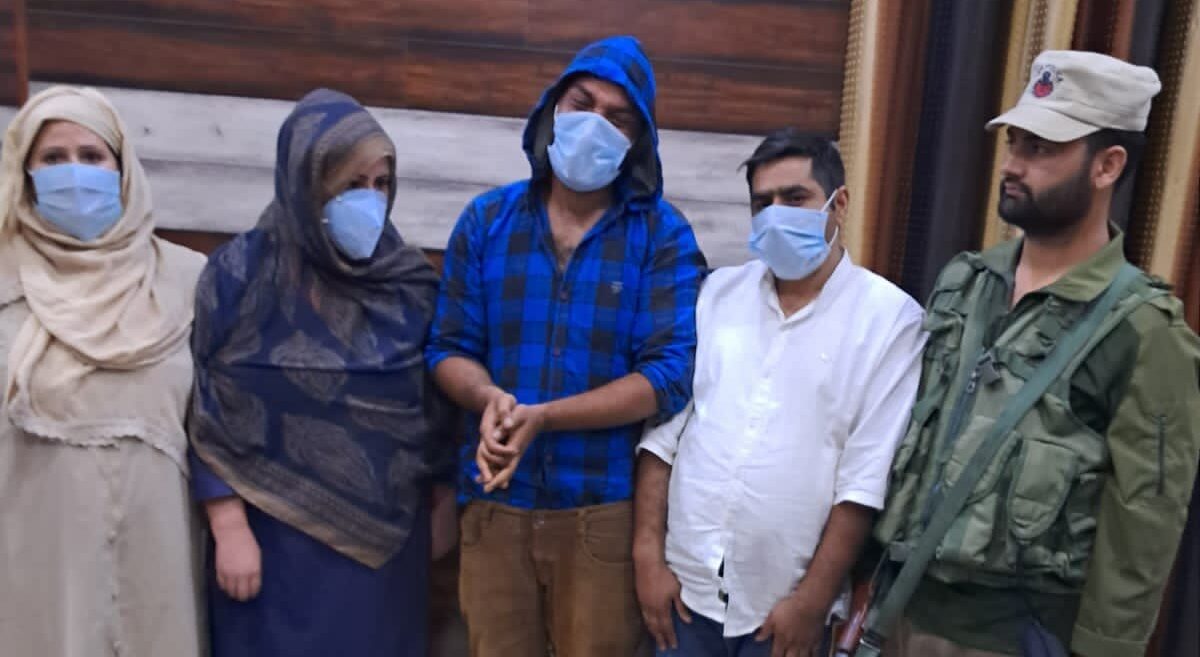The virtual Kashmir is facing music as the upsurge in crimes keeps the cyber police too busy. Cases of fraud, bullying, hacking, extortion, honey trapping, sextortion and blackmail are taking place round the clock in a society where almost everybody owns a smartphone. Babra Wani meets the real victims of the virtual world and interacts with the officials and activists manning the mess

Sanya, 17, was drawn into a distressing ordeal after receiving an unsolicited message on Facebook. Aware of her vulnerability as a teenager and someone who lost her mother recently, she ignored it. Persistently inundated with messages from the same account, Saniya eventually responded. “That was a mistake on my part because things took a turn for the worse,” she acknowledged.
Amir, initially presented himself as a senior army official – a resident of South Kashmir, posted in Sopore, engaged Saniya with promises of employment. She took the bait. Soon, he suggested discussing opportunities over the phone. Subsequently, Amir began soliciting financial assistance from her. Almost daily, he sought money, sometimes contacting her from a different number.
Growing suspicious with every passing day, Saniya shared things with some acquaintances, who disclosed Amir’s predatory behaviour. “His friend revealed a pattern: luring vulnerable girls, soliciting money, engaging in inappropriate conduct, and then resorting to blackmail,” she disclosed.
Now, she attempted to sever ties but encountered persistent pursuit from Amir. “When I declined, he began issuing threats,” Saniya revealed. Initial interactions were amicable. “Soon, Amir resorted to emotional manipulation and proposed marriage. Once, he even got me to talk to his mother and finally, he resorted to threats that he would ruin my career, harm my father and damage my relatives.” Initially, at times, she felt he was sincere.
Sanya knew that Aamir’s profile pictures were stolen. She also knew he ensnares young girls. She started documenting her interactions with him as a possible defence in case the situation pushed her to any extreme.
“Amir possessed my photos, some of which he manipulated into explicit images, leveraging them for blackmail. I felt trapped, oscillating between moments of courage and capitulation,” she disclosed. Once, Amir provided her with a fake female profile, coercing her to engage with different boys to exploit them financially. “I did it twice because he threatened me,” Saniya admitted.
Blackmail
The profile was traced back to Amir’s number, with all proceeds funnelled to him.
Amir possessed the personal information of numerous victims, which he utilised to ensnare boys online, sharing images, bank details, and Aadhar card information. “He shared those details with me too, urging me to entrap boys,” she revealed. Later, Amir requested Saniya to link her bank account with his phone number for seamless transactions. “I questioned the necessity, stating that if he intended to get money, direct transfer is all right. Why link my account with his number?”

on September 28, 2022, in a case of sextortion and blackmail. Pic: JKP
Saniya, like many of Amir’s victims, transferred money to him. “I sent him Rs 2000 once, but when he introduced the fake account and instructed me to tarnish my reputation, I saw his true deceitful, cunning, and malicious nature.”
He continuously asked her for a physical meeting but Saniya remained steadfast in her refusal, sensing his malicious intent. “I had a strong intuition that meeting him would lead to trouble. I barely knew him. Why would I risk it?” she reasoned, further incensing Amir.
A Saviour
Somehow, Saniya discovered a revealing video titled Honeytrapper Exposed, crafted by Dr Abdul Bari Naik. Quickly, she contacted him sharing her harrowing experiences, and providing him with comprehensive details. Bari proceeded to file a formal complaint with the police.
Shortly after the complaint was lodged, Saniya received a call from Amir’s number. “When I answered the call, it was Amir. Initially, he inquired if I had provided evidence against him. I denied any involvement, fearing repercussions on my reputation,” Sanya remembers. “Subsequently, his mother spoke to me, questioning my actions and urging me to retract my statements. They claimed their reputation was tarnished because of me and urged me to contact the police and retract my accusations.”
This established the fact that Amir’s family, including his mother and sister, were complicit in his activities.
“Dr Abdul Bari Naik provided invaluable assistance, removing my pictures from Amir’s phone and revealing that Amir used editing apps to manipulate images of girls,” she said. Amir is in jail.

A former government employee residing near Qaimoh, Bari has exposed numerous honeytrap cases over several years, often with the aid of concerned students who act as his volunteers.
“There was a perpetrator who lured individuals and extorted money from them. Upon learning of a girl having transferred Rs 21,000 to him, one of my students alerted me. We devised a plan, and the student himself transferred Rs 16,000 to expose the perpetrator,” Bari said. “The perpetrator, hailing from Arwani, exploited girls by taking compromising photos and blackmailing them.”
While uncovering one case, Bari gained insights into honey trappers in other districts, prompting him to mobilise his sources to expose them. “When we hear about these stories, it is truly disturbing. I uncovered a case where a young man exploited his own younger sisters to ensnare adult men,” he said. “I have ensured they face consequences. I have facilitated the imprisonment of nearly 11 boys involved in such crimes.”
Bari exposed a case in Budgam involving two brothers. “In another case, a man manipulated women, leading to some getting pregnant. I ensured he faced the repercussions, resulting in his incarceration,” he said. He emphasised that both men and women are implicated. “I am currently dealing with a case where a woman is trapping boys and men.”
Distressingly, Bari receives a steady stream of pleas for help, primarily from young women facing blackmail and entrapment. However, it is crucial to recognise that male victims also suffer in silence, hindered by societal taboos from seeking assistance.
In Srinagar, Bari is currently investigating cases involving honeytraps. “Every time a victim approaches me, I endeavour to recover their funds, hence I am unable to disclose further details at this time,” Bari said.
“I strive to assist individuals to the best of my ability. Unemployment appears to be a significant contributing factor, given the paramount importance of economic stability. Additionally, substance abuse, particularly drug addiction, exacerbates the situation.”
“What happens in matrimonial scams is that people were approached for marriage purposes and then when anyone shows interest they are asked to pay to continue the process,” Sheikh Asif, a Srinagar-based IT expert said. “Once people pay, they get blocked and there is no communication.”
For staying safe on digital media, he said, there are measures that one should take. “Never click on any type of link, and keep changing your passwords and never share your personal details. Nothing literary nothing will make you rich overnight, be safe online. Use your smart phones, very smartly,” he suggested.
Off The Social Media
Almost two months ago, Saba encountered a message request on her Instagram account. “As soon as I confirmed the following request and accepted the DM request, I started getting unwanted attention,” she revealed. “At first, it was just hi, hello messages, but later the nature changed.”
Soon, Saba found herself subjected to obscene and objectionable messages. “Initially, it was just messages, then that account started sending me nude pictures,” horrified, she said. “I blocked him right away, but then similar accounts started texting me, so I decided to delete my account.”

Currently pursuing her graduation at a Srinagar college, Saba was affected by the distressing messages. Despite friends advising her to file a complaint with the cyber police, scepticism deterred her. “I was like if I file a complaint, maybe my name will be involved, so I didn’t,” she admitted. “But yes… The whole experience was traumatising because I had to deal with it for a long time.”
Having encountered similar issues as a teenager on Facebook, Saba had previously deleted her account, emphasising the negative impact of facing sexual harassment even in the digital space.
Confronting Abuse
Although Saba did not report the incident to the cyber cell, there are numerous girls and women of all ages who, rather than succumbing to harassment, opt to confront it.
In a parallel experience, Insha, too, fell victim to online harassment, enduring online stalking and the public sharing of her pictures.
“I remember receiving a friend request from an impersonator who had my picture on its display,” Insha shared. “At first, I reported it, since we have that option on the social media platforms, but when it was not removed, I decided to tell my brother, and he decided to take some action.”
Insha’s brother, a police officer’s friend, intervened and resolved the matter.

However, the experience left Insha so frightened that she removed her pictures from all social media platforms. “My brother told me it would not have happened had I been more careful. Which is true; I believe I was too reckless on social media.”
While Insha attributes her loss of peace of mind to recklessness, for Suhaib, it was a life-altering incident involving a WhatsApp forward.
Online Scams
Suhaib, a 29-year-old resident of South Kashmir, fell prey to online fraud while using WhatsApp. A message from an unknown number presented an opportunity for extra income, prompting Suhaib to click on the provided link without much consideration.
As he followed the procedure, initial scepticism faded. However, when he found himself divulging personal details, realisation dawned. “When they asked me for bank details and an OTP, I gave it to them, but soon received a message that an amount was debited from my account,” he said. “I was devastated. I filed a complaint and took all necessary steps to recover my money. Since that day, I block any unknown number that texts me.”
Suhaib’s experience is not isolated. The Curative Scam, which made waves in Jammu and Kashmir in 2023 fall, serves as a stark example of how individuals, like Suhaib, become victims of online fraud. Investigations into the swindle unveiled numerous cases where the online company deceived Kashmir residents. Some media reports put the total money taken by fraud at more than Rs 50 crore. Sleuths investigating the case said the company had taken Rs 15 crore in two months. “We arrested one person from Tamil Nadu and others are on the run,” one officer privy to the developments said. “Some money was also recovered. Since the accused are from Jammu and other places across the country, the case has been transferred to the Jammu and Kashmir Police’s Crime Branch that looks after the economic offences.”
Highlighting the broader issue, cases of online shopping fraud have also surfaced. Nagma is one such victim, facing the repercussions of falling prey to a fraudulent online transaction.
Online Shopping Scams
Nagma, a 23-year-old resident of Srinagar, found herself entangled in a disastrous online shopping experience. While browsing the internet, she encountered an account selling clothes, captivated by the designs and style.
Despite a red flag—comments disabled on the account—Nagma proceeded to place an order. “After I placed my order, I was asked to make an online payment, which I did. I eagerly awaited my order, as I liked the dresses,” she shared.
After nearly ten days, Nagma received a call informing her about the delivery. However, the joy was short-lived. Upon opening the package, she discovered only a small shirt, nothing like what she had ordered. “I wanted to return the order, but the account had blocked me. I was swindled.” With no means to contact the seller, Nagma had to come to terms with the fact that she had fallen victim to an online fraud. “I learned a lesson that I should not trust these online pages, and I should never ignore how these pages turn off their comments,” Nagma emphasised.
Saima, echoing a similar experience, fell victim to an online shopping scam on Instagram. When her order failed to arrive, she contacted the sellers, who instructed her to track the order through a link. Clicking on the link proved to be a costly mistake, as her account was emptied of tens of thousands in savings. Though she fought against the scam, only half of her money was recovered.
While online shopping scams are on the rise, hacking remains one of the most prevalent online crimes. Bisma, too, became a victim of cybercrime.
Privacy Breach
In 2017, while still in college, Bisma initiated a Facebook profile, connecting with a mix of known and unknown individuals, embodying the carefree nature typical of a teenager. Unbeknownst to her, this approach would render her vulnerable to an unforeseen threat.
Bisma recounts forming an online friendship with a stranger, entrusting him with personal details, ranging from her address to her parents’ workplace. “I trusted him with my life,” she said. “But he had some other things on his mind.”
During a chat, the acquaintance sent Bisma a link, urging her to access it. Blindly trusting, she clicked on the link without hesitation, submitting her ID and password upon request—an action she now recognises as her significant mistake. “As soon as I gave my ID password, the link expired. But soon in my messenger, I saw messages being sent; my account had been hacked.”
Confronted with the stark reality that her supposed friend had access to her account, reading all her conversations and saving personal pictures, Bisma found herself in a distressing situation. “He asked me to give him money if I wanted access back to my account. I did not have any money; what money would a school-going kid have?”
Upon seeking advice from her best friend, Bisma changed her password and ultimately deleted the account after multiple attempts. Despite facing nightmares and anxiety throughout the week, she made a firm decision to abstain from social media. Six years later, she remains disconnected from every social media platform.
Bisma’s experience is not isolated, as many individuals globally fall victim to hacking. Notably, government websites are frequent targets. According to Cybersecurity Ventures, global economic losses from cybercrime are projected to reach US$10.5 trillion by 2025, a significant increase from US $3 trillion in 2015.
Online Betrayal
Sara, 27, has come forward to share a harrowing tale of her online experience, an ordeal that has left enduring scars. In 2015, during her early college days, Sara entered into a romantic relationship with a man five years her senior, whom she had met online.
Initiating contact through Facebook, Sara and her partner, a Kashmiri student in Chandigarh, expanded their communication to WhatsApp. Recalling those initial days, Sara admitted, “I was naïve, new to online interactions and dating. Experiencing freedom for the first time, I went with the flow.”
As their connection deepened, the exchange of pictures evolved into discussions about intimate matters and the sharing of explicit images. Sara, caught in the throes of love, later confessed, “I trusted him with everything. I know I was wrong, but back then I did not realise that.”

Trouble arose when the boyfriend, upon returning to Kashmir, insisted on a physical relationship, a demand Sara resisted. Feeling the pressure intensify, she began avoiding his calls and messages. “Then one day he called me from another number, hurling abuses and threats. He threatened to expose my pictures to my father,” the young lady said.
Devastated, Sara, unsure of how to cope, contemplated ending her life but was fortunately rescued. “Then I blocked that guy from everywhere, deleted all my accounts, and ended the relationship,” she revealed. However, the torment continued as Sara received over 100 anonymous calls, making her realise her number was public. Taking decisive action, she broke her phone and SIM card, acquiring a new number. “As soon as I got my new number, I got a new life.”
Her story, sadly, is not an anomaly; numerous others like Sara grapple with the consequences of online mistakes. According to Cyber Police Kashmir’s official website, reported cybercrime cases have witnessed an uptick.
The Budgam Case
In Budgam, Yasir discovered a potential honeytrap scheme in his area and sought assistance from Bari.
“Dr Sahab advised me on the course of action, and together with my friends, we decided to expose the honeytrap operation.”
The scheme operated through a fake Facebook account under the name “Shazu Shaziya,” allegedly offering sexual services in exchange for money.
“I initiated contact with the account, expressing interest in their services. They requested a monetary transfer of Rs 400 and promised to call me shortly.”
Yasir, prepared with recording equipment, aimed to gather evidence. “Upon their request for additional funds, I complied, all the while gathering account details to trace them. However, they blocked me upon realising my intentions.”
The account’s authenticity was subsequently disproved, with Yasir providing gathered information to Abdul Bari.
“Shazu Shaziya, managed by a male, targeted unsuspecting boys with sexually suggestive content, soliciting money upon engagement.”
Escalating Cyber Crimes
Sources within Cyber Police, Kashmir, emphasised that online sexual harassment cases dominate their caseload. “We always protect the identity of the victims. These cases come to us in bulk,” the officer said. Among the prevalent cybercrimes in Kashmir are sextortion, cyberstalking, circulation of explicit materials, and financial scams, including loans and frauds.
In 2023 alone, Cyber Police Kashmir registered 56 FIRs, with 30 cases proceeding to court. The official highlighted the prevalence of sextortion, terming it an instant and extreme form of blackmail reported to them regularly.

In addressing the rising tide of cyber-crimes in Kashmir, authorities have highlighted a surge in digital offences, encompassing digital sexual harassment, online scams, sextortion, and fraud. According to the National Crimes Bureau Report 2022, India has witnessed an overall increase in cybercrimes, with a noteworthy 31 per cent uptick in online offences reported in Kashmir over the past two years.
The data reveals a substantial escalation in cybercrime cases within Jammu and Kashmir, with 120 cases reported in 2020, followed by 154 in 2021 and 173 in 2022. This signifies a concerning growth trend in digital offences. It needs to be mentioned here that only a fraction of cases are reported to the police and most of them remain unreported for one or the other reason.
Officials from Cyber Police Kashmir underscored the need for enhanced public awareness in navigating cyberspace and technology. They emphasised basic precautions such as refraining from sharing personal details or OTPs and debunked myths surrounding the blocking of SIM cards, ATM cards, or cutting electric connections. Additionally, they cautioned against falling for dubious business models promising unrealistic returns.
Commenting on the intricacies of sextortion, a Cyber Police official explained, “In sextortion, our society’s limited tech-savviness becomes evident. For instance, when a person receives a video call, there is a lack of control over the content on the other end. Exploiting this vulnerability, perpetrators capture screenshots and initiate blackmail.”
Revealing the diverse nature of culprits, the sources disclosed, “Perpetrators in these online crimes can be both locals and non-locals. Sometimes, individuals are involved, but more often, it is orchestrated by an entire gang.”
Besides, officials disclosed that they have received over 300 complaints related to online job scams. They issued a cautionary statement, asserting that anyone could fall victim to these cybercrimes and stressed the urgency of public vigilance.
As Kashmir grapples with the escalating menace of cybercrimes, the call for proactive measures and heightened awareness gains prominence. Cyber Police Kashmir urged citizens to leverage available platforms, including portals and police stations, to file complaints and seek redressal. In a collective effort to curb the growing threat, fostering a more cyber-savvy society remains a paramount objective.
(Names changed for privacy.)















